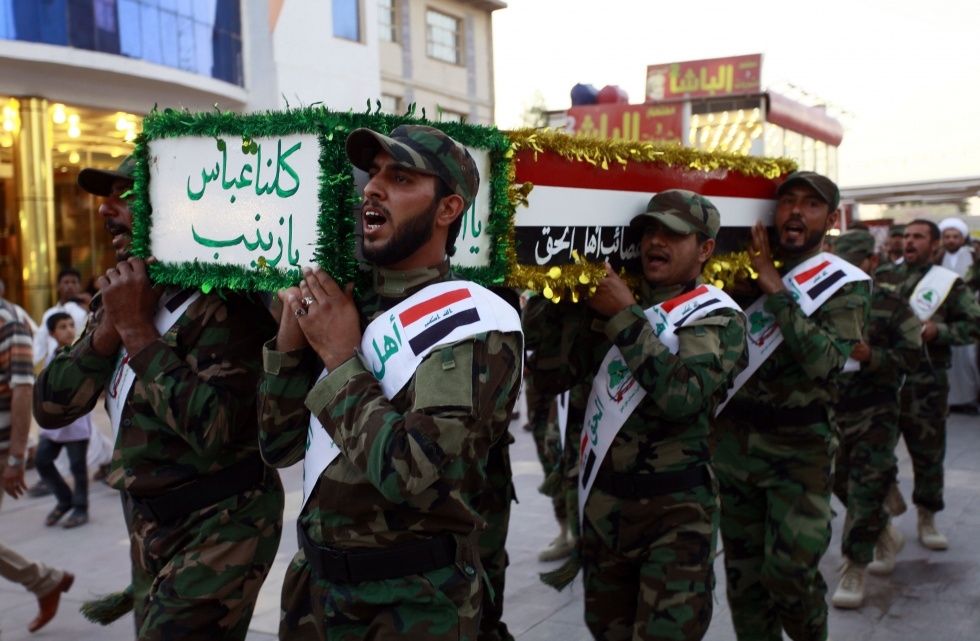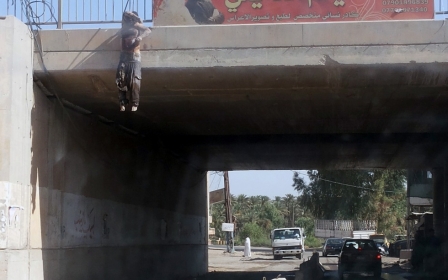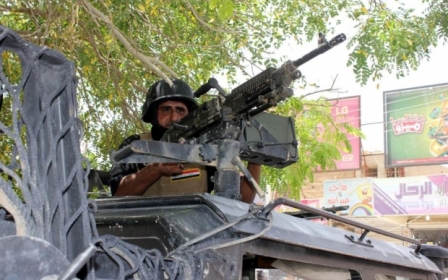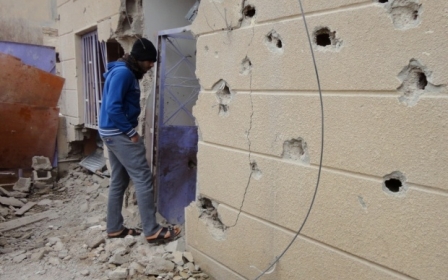License to kill civilians with impunity in Iraq

The decree by the 'Sunni' Islamic State (IS) in the north of Iraq, which forced Iraqi Christians to leave the city of Mosul, was soon mirrored in a decree by the 'Shiite' Ahlil-Haq militia in the south of the country forcing the Sunni residents of Basra city to leave Basra within 72 hours or face death.
In an unprecedented series of atrocities, the Iraqi government forces, in so far as they can still operate in impunity, are competing with IS and Ahlil-Haq in targeting civilians.
A man leaving Fallujah with his family told Al Arabiya News Channel: "Falluja has become a ghost town, abandoned. We are going to areas outside to save our children, families and women from the indiscriminate shelling."
Most major Iraqi towns have the full spectrum of the ethnic and religious diversity of the country. It has always been such, whether through intermarriage, tribal ancestry, shared business and ownership of land or just centuries of being neighbours. Targeting Christians, Yazidis, Mandaeans and all minorities by forcing them to leave their homes is an aspect of war against civilian populations and the systematic fragmentation of a society and a country. It is a dissemination which had begun immediately after the occupation, long before IS took over Mosul city in June 2014. It is normally what turns a town into a ghost town; it also a breeding ground for something nastier to come.
In his comment on the Iraqi security forces and militias affiliated with the government executing at least 255 prisoners, eight of them boys under 18, in 6 Iraqi cities and villages since June 9, 2014, Joe Stork, deputy Middle East director at Human Rights Watch, warned that "While the world rightly denounces the atrocious acts of ISIS, it should not turn a blind eye to sectarian killing sprees by government and pro-government forces”. The HRW report described the nature of the "mass extrajudicial killings" as a "revenge killings for atrocities by ISIS" that could be "evidence of war crimes or crimes against humanity".
In such mayhem, while the condemnation of brutal crimes by IS against minorities and the destruction of monuments and religious places is a necessity, we must also avoid attributing every single crime committed in Iraq to IS in the heat of the moment. We have to look into the unabated crimes and massacres committed against Iraqi people, not sparing any minority or dissident who dares to protest, since 2003.
The US-led occupation and subsequent proxy Iraqi regimes have been practising, either unilaterally or together, no less than state terror against civilians. In the aftermath of US forces withdrawal in 2011, over a million Iraqi security forces and police, in addition to the special forces attached to the Prime Minister’s office mostly trained by the US and the UK, became the tool of murder, torture, rape, kidnapping, and revenge. This exercise in state terror, plus using Iraq as a battlefield to settle scores of US-Iran negotiations over nuclear power, has resulted in establishing the horrifying reality of today's Iraq. The reality of daily killings, the silent death due to long lasting effects of US-UK Depleted Uranium , corruption and the rise of a new generation of youth who identify themselves according to their sect or ethnic background and who are willing to avenge or die for their newly manufactured identities.
An example of the Iraqi regime's recent crimes is its arbitrary shelling and the use of barrel bombs on five cities, in the north and the west of Iraq: Fallujah, Beiji, Mosul, Tikrit and al-Sherqat.
In Fallujah 507 people had been killed and another 1,806 were wounded by the air strikes, artillery and mortar shelling.
In Anbar province, almost 80,000 families (close to 500,000 individuals) have fled the province since January this year. Barrel bombs, which are made from high explosives, cement and metal parts packed into oil drums and are usually dropped from helicopters, are indiscriminate in their nature and violate international law. HRW have documented the consistent usage of unguided air-dropped bombs in populated urban areas in Mosul, Tikrit, Fallujah, and in Al-Sherqat. According to the report, "The attacks hit areas surrounding mosques, government buildings, hospitals, and power and water stations. Residents in Mosul, al-Sherqat, and the oil-refinery town of Beiji described a pattern of intensifying strikes throughout the first half of July in areas where groups of civilians had gathered".
The continuous campaign of collective punishment, as well as the marginalizing of at least half the population is what pushes them to revolt and demand justice. To portray half the population as the embodiment of international terrorism regurgitated, in the weekly televised speech of Prime Minister Nouri al-Maliki, thus legalising their kidnapping and extrajudicial detention, interrogation and torture, as well as execution without fair trials, is not the way to achieve reconciliation.
The last decade of combined imperial occupation and proxy Iraqi regimes with no loyalty to Iraq, have proved two points beyond doubt. First; all Iraqis, regardless of their religion or sect can be accused of being terrorists or potential terrorists and treated accordingly. Second; imperial and regional powers will not allow Iraq to establish a democratic sovereign state which enjoys a sovereign economy and human rights. This aspiration will only be achieved by united Iraqis themselves with the support of international solidarity movements.
-Haifa Zangana is an Iraqi author and co-founder of Tadhamun Iraqi Women Solidarity organisation. She is also the founding member of the International Association of Contemporary Iraqi Studies.
The views expressed in this article belong to the author and do not necessarily reflect the editorial policy of Middle East Eye.
Photo: Iraqi mourners carry the coffin of a member of the Shiite militia Asaib Ahl al-Haq (The League of the Righteous) who was reportedly killed in Syria, during his funeral, on June 26, 2014, in the central shrine city of Najaf (AFP)
Stay informed with MEE's newsletters
Sign up to get the latest alerts, insights and analysis, starting with Turkey Unpacked
Middle East Eye delivers independent and unrivalled coverage and analysis of the Middle East, North Africa and beyond. To learn more about republishing this content and the associated fees, please fill out this form. More about MEE can be found here.





